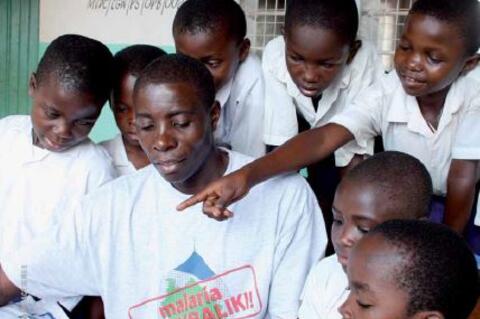National Malaria Control Programme (NMCP)

The communication campaign aims to raise awareness among the public, especially vulnerable groups, to seek early treatment for malaria, to treat malaria correctly using the new ACTs, and to complete the full three-day treatment.
The campaign uses multi-media tools including audio and video public service announcements (PSAs) aired on television, radio, and via mobile video units throughout Tanzania. Posters were placed in health facilities and an information kit designed for medical professionals and influential leaders (e.g. members of parliament, religious leaders). A 30-minute documentary, narrated by Julius Nyaisanga, a nationally recognised television and radio broadcaster in Tanzania, was also developed. Video production was managed by Real 2 Reel Film Productions.
National music stars have been engaged in promoting the key messages of the campaign, including the African Stars Band-Twanga Pepeta and Parapanda who created two songs to reinforce the three key objectives of the campaign:
- improving recognition of and response time to malaria symptoms in children under five;
- raising public awareness of the availability and effectiveness of the new ACT drug; and
- increasing understanding of the importance of completing the full 3-day treatment.
Health.
In Tanzania, an estimated 16-18 million cases of malaria occur each year, resulting in more than 100,000 deaths. Malaria accounts for some 30% of the national disease burden, 35% of hospitalisations, and 37% of deaths for children under five. Among pregnant women, malaria and anaemia are responsible for 25% of maternal deaths.
According to the organisers, since December 2006, the MoHSW/NMCP under the leadership of the Minister of Health and Social Welfare made the ACT available through all government health facilities and faith-based organisations. Tanzania’s new ACT treatment policy, translated in Kiswahili, as Dawa Mseto Ya Malaria was officially launched on Africa Malaria Day April 25 2007 in the Kagera Region in Western Tanzania. The MoHSW/NMCP is providing the ACTs free of charge for all children under 5 and at a subsidised price for the rest of the population with particular attention to free treatment for vulnerable populations.
The MoHSW/NMCP has mobilised its partners including: the Medical Stores Department for procurement and distribution of the ACTs; the Tanzania Food and Drug Authority to provide quality assurance; Population Services International (PSI) to develop, pre-test, and disseminate the communication campaign materials; Africare and PLAN International to provide social mobilisation to educate rural communities; Ifakara Research Centre to research usage of the new drugs; and TaNAAM to mobilise regional forums.
Real 2 Reel Film Productions, Ministry of Health and Social Welfare, National Malaria Control Programme, Tanzania Food and Drug Authority, Population Services International (PSI), Africare, PLAN International, Ifakara Research Centre, TaNAAM, Global Fund to Fight Aids, Tuberculosis, and Malaria.
PSI website on July 26 2007 and August 6 2009.
Comments


antimalarials
Regarding recomendations for registering antimalarials this organisation is still not vigilant on knowing which drugs have failed in other asian countries. There are some brands which contain very smaal amount of artemisinin and may bring the danger of resistance in our country.
Yours,
Pharmacovigilanti
- Log in to post comments
